In a major escalation, the US sanctions 22 companies from UAE, Turkey, and Hong Kong linked to Iran’s oil trade. Tehran calls it economic warfare.

In a sharp escalation of its economic pressure campaign, the United States has imposed new sanctions on 22 entities based in the United Arab Emirates (UAE), Turkey, and Hong Kong for allegedly facilitating Iran’s oil and petrochemical exports. This latest move signals Washington’s growing frustration over Tehran’s evasion of sanctions and its continued oil trade despite existing restrictions.
The companies, described by the U.S. Department of the Treasury’s Office of Foreign Assets Control (OFAC) as “key facilitators of Iran’s shadow oil economy,” are accused of helping Tehran disguise, ship, and sell crude oil and petroleum products on the international market. These sanctions come at a time when diplomatic talks with Iran remain stalled, and regional tensions are at an all-time high.
Why These Sanctions Now?
This announcement follows a pattern seen over the past two years: the U.S. government identifying and targeting foreign firms that help Iran bypass existing restrictions by using complex shipping and financial networks to conceal the origin of oil products.
According to the Treasury, the targeted companies were “engaged in the transport or sale of Iranian-origin petroleum or petrochemical products” and used front companies, forged documents, and ship-to-ship transfers to disguise the origin of cargo. These operations often rely on shell firms registered in countries with lax oversight — including in global financial hubs like Dubai and Hong Kong.
The new wave of sanctions reflects not just economic policing but also geopolitical signaling — that the U.S. is unwilling to tolerate Iran’s economic resilience or the global indifference toward enforcing sanctions.
Key Targets: Who Was Named?
While the U.S. has not released the full list publicly yet, several firms from UAE’s free trade zones, Turkish port facilitators, and Hong Kong-based shell companies are believed to be involved. These entities are accused of:
Operating oil tankers using false flags or disabled transponders to hide movements.
Laundering profits through third-party bank accounts and digital wallets.
Falsifying bill of lading documents to show crude shipments as originating from countries like Iraq, Oman, or Malaysia.
Some of the sanctioned firms were also reportedly linked to China-based buyers, though the U.S. has not officially sanctioned any Chinese companies in this round — a sign Washington may be walking a fine line with Beijing amid broader tensions.
U.S. Officials: “We Will Keep Tightening the Noose”
In a statement, Under Secretary of the Treasury for Terrorism and Financial Intelligence Brian E. Nelson said:
> “The United States will continue to expose and disrupt the shadow networks used by the Iranian regime to evade sanctions. Those facilitating this illicit trade are on notice: aiding Iran’s energy sector comes at a serious cost.”
This rhetoric is not just aimed at Iran, but also at all countries doing business in the grey zone — where legality is bent, and oversight is minimal.
Iran Responds: “Economic Warfare”
Unsurprisingly, Tehran was quick to respond. In a statement released through its Foreign Ministry, Iran condemned the sanctions as “hostile and hypocritical,” accusing the U.S. of engaging in economic warfare under the guise of diplomacy.
A senior Iranian official, speaking to local media, stated:
> “America wants to suffocate Iran’s economy, but it only exposes its own desperation. They cannot stop our oil exports because we have friends, we have markets, and we have alternatives.”
Iran maintains that its oil trade is legal under international law and insists that it is not bound by unilateral U.S. sanctions. But the truth is more complicated — most of the world’s oil trade infrastructure is still intertwined with U.S. financial and legal systems, making enforcement both possible and painful.
Global Oil Implications: Why the Market Is Watching
While Iran is not a top-three oil exporter globally, its oil — sold at discounted “gray market” prices — significantly affects global supply, especially in Asia.
Traders are now watching closely to see whether these sanctions will result in:
Tightening supply and pushing global prices upward.
Greater use of ghost fleets and black-market shipping.
Further shifts in Iran’s oil exports toward non-Western buyers, such as China, Syria, and Venezuela.
With the Russia-Ukraine war and OPEC+ production cuts already pressuring the oil market, any disruption or overreaction to U.S. sanctions could spike prices — something the Biden administration is eager to avoid heading into the 2025 election cycle.
Turkey, UAE, and Hong Kong: Caught in the Crossfire
One of the most delicate parts of this story is how U.S. allies and trade partners are entangled in Iran’s illicit oil economy.
The UAE, while a close ally of Washington, has long served as a logistical and banking hub for global trade — including questionable transactions. The U.S. has pressured Dubai in the past, but enforcement remains difficult.
Turkey, a NATO ally, has pursued its own agenda in the Middle East, often resisting Western efforts to isolate Iran. Turkish firms, especially smaller shipping and logistics companies, are often accused of operating in the gray zone.
Hong Kong, under Chinese influence, provides legal and financial anonymity to shell corporations. Sanctioning firms there sends a message to Beijing, without directly confronting Chinese state-owned entities.
This triangulation of geopolitics, trade, and law enforcement makes it difficult to draw a clean line between legal oversight and realpolitik.
My Take: Sanctions May Bite, But They Won’t Break Iran
From my perspective, this is a familiar playbook. The U.S. imposes sanctions, Iran sidesteps them, and global middlemen make a fortune acting as intermediaries. It’s a game of financial cat-and-mouse, where oil barrels are shipped under different names, through ghost fleets, using fake paperwork.
While these new sanctions will no doubt hurt, especially for small firms in the UAE and Turkey that depend on Iranian oil flows, I doubt they will break the backbone of Tehran’s energy network.
Why? Because Iran has adapted. Its oil economy now lives in the shadows — digital wallets, private ports, and handshake deals.
If Washington truly wants to contain Iran economically, it must confront not just Tehran, but also the global system that allows black-market trade to flourish.
Conclusion: The Sanctions Race Continues
The latest U.S. sanctions targeting 22 entities in the UAE, Turkey, and Hong Kong show Washington’s resolve to strangle Iran’s energy income. But this is more than just a diplomatic signal — it’s a multi-layered confrontation playing out in global shipping lanes, oil terminals, and backroom deals.
While the Biden administration ramps up enforcement, Iran continues to adapt and survive — proving that in today’s world, where money flows faster than borders can contain it, economic war is a battle of endurance, not knockout punches.

